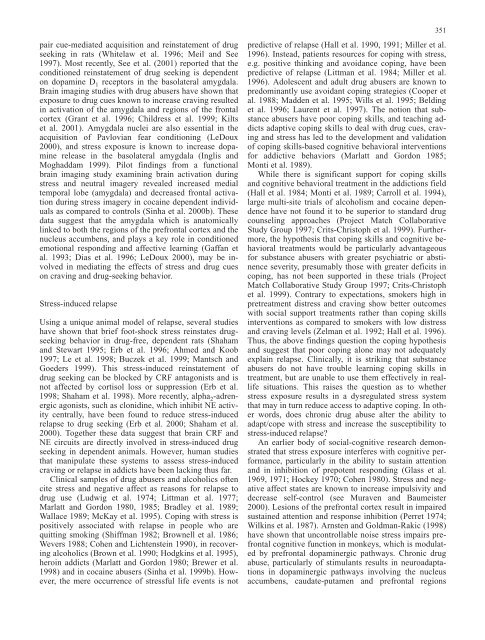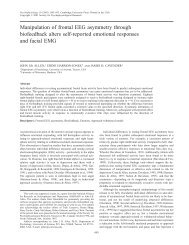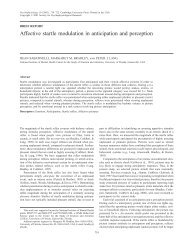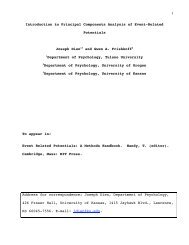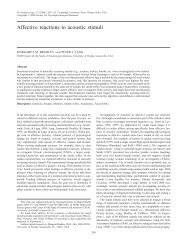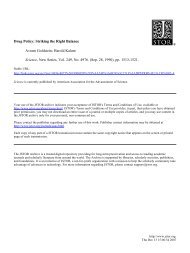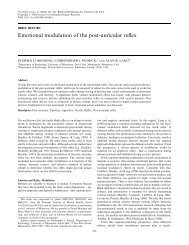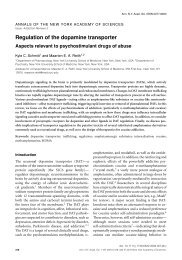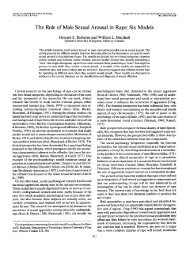How does stress increase risk of drug abuse - Addiction Research ...
How does stress increase risk of drug abuse - Addiction Research ...
How does stress increase risk of drug abuse - Addiction Research ...
Create successful ePaper yourself
Turn your PDF publications into a flip-book with our unique Google optimized e-Paper software.
pair cue-mediated acquisition and reinstatement <strong>of</strong> <strong>drug</strong><br />
seeking in rats (Whitelaw et al. 1996; Meil and See<br />
1997). Most recently, See et al. (2001) reported that the<br />
conditioned reinstatement <strong>of</strong> <strong>drug</strong> seeking is dependent<br />
on dopamine D 1 receptors in the basolateral amygdala.<br />
Brain imaging studies with <strong>drug</strong> <strong>abuse</strong>rs have shown that<br />
exposure to <strong>drug</strong> cues known to <strong>increase</strong> craving resulted<br />
in activation <strong>of</strong> the amygdala and regions <strong>of</strong> the frontal<br />
cortex (Grant et al. 1996; Childress et al. 1999; Kilts<br />
et al. 2001). Amygdala nuclei are also essential in the<br />
acquisition <strong>of</strong> Pavlovian fear conditioning (LeDoux<br />
2000), and <strong>stress</strong> exposure is known to <strong>increase</strong> dopamine<br />
release in the basolateral amygdala (Inglis and<br />
Moghaddam 1999). Pilot findings from a functional<br />
brain imaging study examining brain activation during<br />
<strong>stress</strong> and neutral imagery revealed <strong>increase</strong>d medial<br />
temporal lobe (amygdala) and decreased frontal activation<br />
during <strong>stress</strong> imagery in cocaine dependent individuals<br />
as compared to controls (Sinha et al. 2000b). These<br />
data suggest that the amygdala which is anatomically<br />
linked to both the regions <strong>of</strong> the prefrontal cortex and the<br />
nucleus accumbens, and plays a key role in conditioned<br />
emotional responding and affective learning (Gaffan et<br />
al. 1993; Dias et al. 1996; LeDoux 2000), may be involved<br />
in mediating the effects <strong>of</strong> <strong>stress</strong> and <strong>drug</strong> cues<br />
on craving and <strong>drug</strong>-seeking behavior.<br />
Stress-induced relapse<br />
Using a unique animal model <strong>of</strong> relapse, several studies<br />
have shown that brief foot-shock <strong>stress</strong> reinstates <strong>drug</strong>seeking<br />
behavior in <strong>drug</strong>-free, dependent rats (Shaham<br />
and Stewart 1995; Erb et al. 1996; Ahmed and Koob<br />
1997; Le et al. 1998; Buczek et al. 1999; Mantsch and<br />
Goeders 1999). This <strong>stress</strong>-induced reinstatement <strong>of</strong><br />
<strong>drug</strong> seeking can be blocked by CRF antagonists and is<br />
not affected by cortisol loss or suppression (Erb et al.<br />
1998; Shaham et al. 1998). More recently, alpha 2-adrenergic<br />
agonists, such as clonidine, which inhibit NE activity<br />
centrally, have been found to reduce <strong>stress</strong>-induced<br />
relapse to <strong>drug</strong> seeking (Erb et al. 2000; Shaham et al.<br />
2000). Together these data suggest that brain CRF and<br />
NE circuits are directly involved in <strong>stress</strong>-induced <strong>drug</strong><br />
seeking in dependent animals. <strong>How</strong>ever, human studies<br />
that manipulate these systems to assess <strong>stress</strong>-induced<br />
craving or relapse in addicts have been lacking thus far.<br />
Clinical samples <strong>of</strong> <strong>drug</strong> <strong>abuse</strong>rs and alcoholics <strong>of</strong>ten<br />
cite <strong>stress</strong> and negative affect as reasons for relapse to<br />
<strong>drug</strong> use (Ludwig et al. 1974; Littman et al. 1977;<br />
Marlatt and Gordon 1980, 1985; Bradley et al. 1989;<br />
Wallace 1989; McKay et al. 1995). Coping with <strong>stress</strong> is<br />
positively associated with relapse in people who are<br />
quitting smoking (Shiffman 1982; Brownell et al. 1986;<br />
Wevers 1988; Cohen and Lichtenstein 1990), in recovering<br />
alcoholics (Brown et al. 1990; Hodgkins et al. 1995),<br />
heroin addicts (Marlatt and Gordon 1980; Brewer et al.<br />
1998) and in cocaine <strong>abuse</strong>rs (Sinha et al. 1999b). <strong>How</strong>ever,<br />
the mere occurrence <strong>of</strong> <strong>stress</strong>ful life events is not<br />
351<br />
predictive <strong>of</strong> relapse (Hall et al. 1990, 1991; Miller et al.<br />
1996). Instead, patients resources for coping with <strong>stress</strong>,<br />
e.g. positive thinking and avoidance coping, have been<br />
predictive <strong>of</strong> relapse (Littman et al. 1984; Miller et al.<br />
1996). Adolescent and adult <strong>drug</strong> <strong>abuse</strong>rs are known to<br />
predominantly use avoidant coping strategies (Cooper et<br />
al. 1988; Madden et al. 1995; Wills et al. 1995; Belding<br />
et al. 1996; Laurent et al. 1997). The notion that substance<br />
<strong>abuse</strong>rs have poor coping skills, and teaching addicts<br />
adaptive coping skills to deal with <strong>drug</strong> cues, craving<br />
and <strong>stress</strong> has led to the development and validation<br />
<strong>of</strong> coping skills-based cognitive behavioral interventions<br />
for addictive behaviors (Marlatt and Gordon 1985;<br />
Monti et al. 1989).<br />
While there is significant support for coping skills<br />
and cognitive behavioral treatment in the addictions field<br />
(Hall et al. 1984; Monti et al. 1989; Carroll et al. 1994),<br />
large multi-site trials <strong>of</strong> alcoholism and cocaine dependence<br />
have not found it to be superior to standard <strong>drug</strong><br />
counseling approaches (Project Match Collaborative<br />
Study Group 1997; Crits-Christoph et al. 1999). Furthermore,<br />
the hypothesis that coping skills and cognitive behavioral<br />
treatments would be particularly advantageous<br />
for substance <strong>abuse</strong>rs with greater psychiatric or abstinence<br />
severity, presumably those with greater deficits in<br />
coping, has not been supported in these trials (Project<br />
Match Collaborative Study Group 1997; Crits-Christoph<br />
et al. 1999). Contrary to expectations, smokers high in<br />
pretreatment di<strong>stress</strong> and craving show better outcomes<br />
with social support treatments rather than coping skills<br />
interventions as compared to smokers with low di<strong>stress</strong><br />
and craving levels (Zelman et al. 1992; Hall et al. 1996).<br />
Thus, the above findings question the coping hypothesis<br />
and suggest that poor coping alone may not adequately<br />
explain relapse. Clinically, it is striking that substance<br />
<strong>abuse</strong>rs do not have trouble learning coping skills in<br />
treatment, but are unable to use them effectively in reallife<br />
situations. This raises the question as to whether<br />
<strong>stress</strong> exposure results in a dysregulated <strong>stress</strong> system<br />
that may in turn reduce access to adaptive coping. In other<br />
words, <strong>does</strong> chronic <strong>drug</strong> <strong>abuse</strong> alter the ability to<br />
adapt/cope with <strong>stress</strong> and <strong>increase</strong> the susceptibility to<br />
<strong>stress</strong>-induced relapse?<br />
An earlier body <strong>of</strong> social-cognitive research demonstrated<br />
that <strong>stress</strong> exposure interferes with cognitive performance,<br />
particularly in the ability to sustain attention<br />
and in inhibition <strong>of</strong> prepotent responding (Glass et al.<br />
1969, 1971; Hockey 1970; Cohen 1980). Stress and negative<br />
affect states are known to <strong>increase</strong> impulsivity and<br />
decrease self-control (see Muraven and Baumeister<br />
2000). Lesions <strong>of</strong> the prefrontal cortex result in impaired<br />
sustained attention and response inhibition (Perret 1974;<br />
Wilkins et al. 1987). Arnsten and Goldman-Rakic (1998)<br />
have shown that uncontrollable noise <strong>stress</strong> impairs prefrontal<br />
cognitive function in monkeys, which is modulated<br />
by prefrontal dopaminergic pathways. Chronic <strong>drug</strong><br />
<strong>abuse</strong>, particularly <strong>of</strong> stimulants results in neuroadaptations<br />
in dopaminergic pathways involving the nucleus<br />
accumbens, caudate-putamen and prefrontal regions


